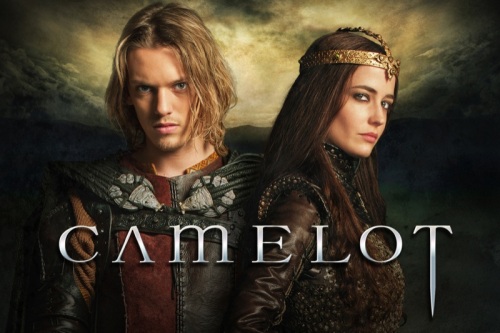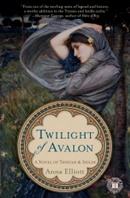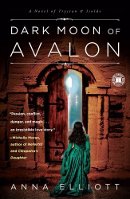Camelot has gotten a lot of attention, not all of it good. I find in the end I’m quite disappointed with the show, although the final episode was intriguing for a few twists and what it left open for the next season, which since the show has been cancelled, is not likely to happen unless the series is picked up by another network – highly doubtful.
This final episode drags through its first half. Arthur shows himself to be fairly stupid in remaining behind at Bardon Pass to fight Morgan’s soldiers by himself just to prove himself to the men, after they are upset with him for sleeping with Leontes’ wife Guinevere. Arthur doesn’t really prove anything except his stupidity. He does make some entertaining traps to stop the enemy, but in the end, he needs the other men to come back and help him anyway. The best part of this whole scene was when one of the opposing soldiers tells Arthur they fight for Morgan and adds, “You’re a fucked up family all right.”
Leontes gets mortally wounded in the battle. As he’s dying he tells Arthur to “treasure her.” Of course, Leontes knows Arthur and Guinevere will get together–this isn’t permission so much as his accepting reality and Leontes is a gentleman to the end. Too bad he has to die; to bad he wasn’t king and Arthur couldn’t die instead. What a waste to create a fake Arthurian character only to kill him off. Why not start out with Lancelot in the first place since Lancelot is apparently going to show up in season 2? Later in the show, the Round Table is built and a special seat is created in Leontes’ memory until someone as good as him can take it. Gawain says it will remain empty, but I suspect it’s the Siege Perilous which normally in the legend only Galahad is pure enough to take, but the writers probably planned to have Lancelot take instead–thus beginning the Arthur/Guinevere/Lancelot triangle.
Merlin also decides to leave after Morgan’s plot is foiled. He should have left a long time ago. While Arthur has been away fighting, Morgan almost ends up being crowned queen, under the belief that Arthur has died. Merlin is tied up and helpless and completely useless to stop the crowning. As I’ve said previously, he’s the most pathetic version of the great wizard in any film or written version of the Arthurian legend to date.
I’d like to mention here that a lot of people have posted about Camelot online besides me, and I’ve read several of the other posts. One I think particularly worth reading is at: http://www.denofgeek.com/television/938298/camelot_episode_10_review_reckoning_season_finale.html because the reviewer thinks the show as ridiculous as I do.
That said, I disagree with this reviewer, as well as most of the others, that Merlin was the best part of Camelot. In fact, as I’ve pointed out in every post I’ve written about Merlin so far, he’s the worst depiction of the famous sorcerer I have ever seen, and totally incompetent when he’s not doddering. Other than getting Arthur a sword and getting him elected king, what has he done of any real value? Did all his stupidity in going with Igraine to Morgan’s castle reflect a deeply thought out plot to get Morgan to Camelot to seize the crown so she can be exposed? If so, he didn’t foresee that Igraine would get killed in the process; and his being tied up and unable to escape during the crowning ceremony just makes him look all the more unimpressive.
Then, after Arthur accuses Morgan of treason and Sybil takes the blame for it, Merlin has to be a total prick by going to watch Gawain behead Sybil and tell her, “There is no God.” Perhaps he’s just that small that he needs to taunt her, to kick his enemy when she’s down, but seriously, how stupid is he to think there’s no God? How else do you explain the other supernatural elements in the show like magic and witchcraft. It’s possible the god in this show isn’t a Christian god, but there’s got to be some godlike force in this program, and God isn’t going to be nice to Sybil after all the bad things she’s done anyway. Saying there’s no God implies there’s no afterlife. But the show obviously makes it clear that’s untrue when Morgan prays at Sybil’s grave and then hears a voice telling her what to do. Sybil is able to influence Morgan from beyond the grave, and since Merlin is now going off to “find himself” as one reviewer put it, I imagine Sybil will have more power than ever, even if it’s filtered through Morgan. At the end of the day, if you had Sybil and Merlin match wits, odds are Sybil would come out ahead. Too bad we can’t give Sybil and Merlin I.Q. tests. I’d rather have a clever villain than a stupid good wizard any day.
I admit I was impressed by the final twist. When Guinevere showed up in Arthur’s bedroom I thought she must be a total slut–Leontes is barely dead and she’s throwing herself at Arthur already–wait at least 30 days, I thought. But we then find out Guinevere was really Morgan in disguise–something I should have guessed from Sybil’s voice telling Morgan to sire a king. This plot twist completely worked for me and solved the problem of Morgan getting pregnant with Arthur’s child–Mordred. In fact, other than Marion Zimmer Bradley’s depiction in The Mists of Avalon of how Arthur and Morgan come together to have a child, I thought it the best explanation for the incest twist in the legend that I have seen. I admit, it made me anxious to see the next season–the season that will not be.
My personal opinion, in the end, is that Camelot had great potential but just about fell flat on its face. Ultimately, only Sybil was able to capture my imagination and retain it through the 10 episodes, although Morgan came close. And if the show is cancelled, we’ll never know just exactly what that wolf was that Morgan slept with. 😦 Oh well, there’s always season 4 of Merlin to look forward to.
________________________
Tyler R. Tichelaar, Ph.D. is the author of King Arthur’s Children: A Study in Fiction and Tradition, available at www.ChildrenofArthur.com






